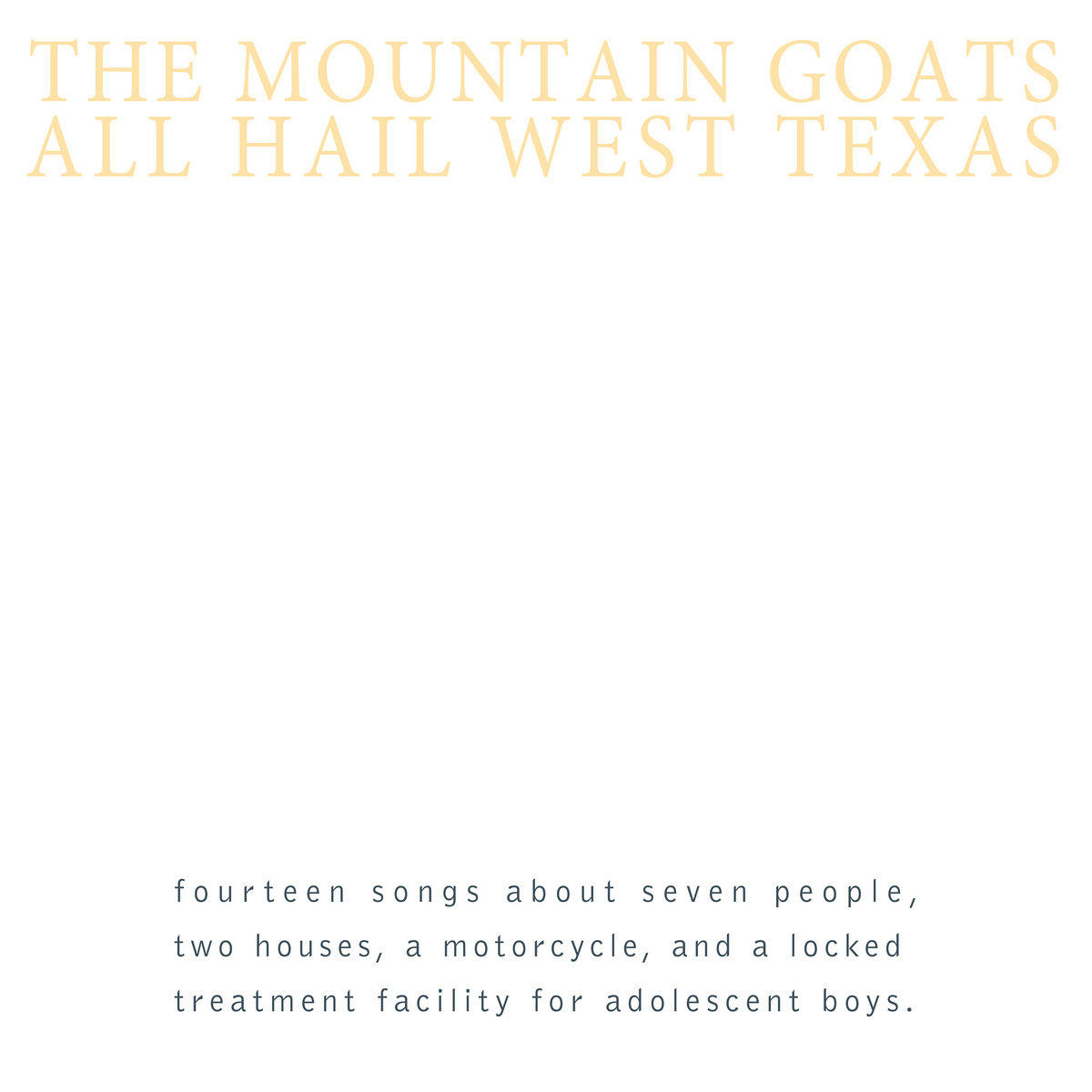I AM GOING TO TAKE THIS A LITTLE WHILE LONGER: 20 YEARS OF ALL HAIL WEST TEXAS
/It is beautiful, sure, but a lot of it is empty. Empty in a way that feels heavy, like the big cities in Texas are just fronts to hide that most of it’s an empty state, with a population trying to be as loud as possible so no one will notice that all of them live tucked away in the east. All Hail West Texas, right? I mean, most of this could be said about America as a whole, but I’m not in America right now– I’m in Texas.
(Keisha, narrator of Alice Isn’t Dead)
I have never been to West Texas, or to anywhere in the American Southwest for that matter, but I’ve often entertained fantasies of escaping to some quiet, near-empty place in the desert. Mitski songs aside, Texas is not a landlocked state. But the vast flatlands seem as infinite as the stars above them, making it easy for one to fall for such geographic optical illusions. These are, as Darnielle described on an episode of I Only Listen To The Mountain Goats, “places where you’re alone with yourself.” In my fictional West Texas, my closest neighbors would be miles away, but my home would be open to a revolving door crew of lonely drifters and passers-through, not unlike the ones in Color In Your Cheeks:
They came in by the dozens, walking or crawling
Some were bright-eyed, some were dead on their feet
But they came from Zimbabwe or from Soviet Georgia
East St. Louis, or from Paris, or they lived across the street
But they came, and when they finally made it here
It was the least that we could do to make our welcome clear
It’s a fantasy defined by solitude, but in such a way that somehow– much like The Mountain Goats’ music –makes me feel less alone. Part of my love for All Hail West Texas lies in this contradiction and keeps me coming back to a central question: How can an album that evokes such emptiness and isolation simultaneously be a deeply powerful celebration of community and human connection?
Like all of my most beloved Mountain Goats albums, All Hail West Texas feels like a collection of overlapping short stories. As its indicatively minimalist album cover promises, it is “fourteen songs about seven people, two houses, a motorcycle, and a locked treatment facility for adolescent boys.” You won’t hear Darnielle giving a breakdown of these seven characters in interviews or definitively saying which songs each one of them is featured in. Some are mentioned by name: Jeff and Cyrus, the two members of the titular Best Ever Death Metal Band In Denton; William Stanaforth Donahue, a 17-year-old ex-running back who gets a federal prison sentence for selling acid after an injury ends his football career; Jenny, a recurring character in The Mountain Goats’ discography who’s seen tearing through the desert on a Kawasaki motorcycle. Other characters are left more ambiguous: somebody who drives two hours to Austin every week just to retrieve postcards from a former friend or lover; Jenny’s admirer whose infatuation prompts him to hop on the back of her motorcycle and ride off into the sunset; a hard-spending and even harder-drinking couple who refuse to part ways no matter how miserable they make each other (some have speculated that these two might be the Alpha Couple, the subjects of the following Mountain Goats album). Darnielle’s storytelling is non-linear, and the information he withholds is as crucial as what is revealed. Recognizable plot points are scattered across a sonic landscape that feels as wide and as empty as West Texas itself.
As we celebrate its 20th anniversary, it feels necessary to highlight the timing of this album. It marks an important turning point in the band’s history as the last album of the fanbase-splitting “lo-fi era.” Production-wise, it was the swan song of Darnielle’s Panasonic RX-FT500 before the long-suffering machine broke down for good. Though most of my favorite Mountain Goats albums are from 2002 onward, my ears perked up upon hearing the return of that familiar tape hiss crackling through 2020’s Songs For Pierre Chuvin.
It’s also worth noting that All Hail West Texas was the first Mountain Goats album released after 9/11. In some ways, it feels like an unintentional post-9/11 cousin to Lift To Experience’s 2001 cult classic The Texas-Jerusalem Crossroads– a sprawling post-rock concept album about the second coming of Christ set in Bush-era Texas. Darnielle’s values– religious, political, philosophical –are made clear throughout his discography, despite his general aversion to stating them overtly. Even though it lacks direct references to specific political stances or issues, All Hail West Texas is arguably the most political Mountain Goats album. The closest thing to a protest song Darnielle has ever written, “Fall of the Star High School Running Back,” tells the tale of a teenage victim of mandatory minimum sentencing. The narrator of “Pink and Blue” lacks adequate resources to care for their new child who’s been abandoned by a birth parent with even less. In the wake of 9/11 and subsequent racist and xenophobic backlash, “Color In Your Cheeks” takes on an additional layer of political significance. It’s a song about the true meaning of “southern hospitality”-- about sanctuary, about community, about opening homes and hearts to those seeking refuge and telling them “you are welcome here.” During its episode of the aforementioned podcast, Darnielle emphasized the importance of the song’s first-person plural perspective: “There’s no ‘me and you;’ it’s ‘us and y’all.’”
Like much of The Mountain Goats’ catalog, the songs on All Hail West Texas recognize that ‘home’ is a multifaceted, often tenuous thing. Pockets of refuge almost always stand on a precarious foundation. The safe havens provided in “Color In Your Cheeks” and “Pink and Blue” are makeshift ones, implied to be temporary. Teenagers Jeff and Cyrus find a home in their shared passion for death metal– a passion also shared by Darnielle himself –but are separated from their music and from each other by disapproving adults. In “Jeff Davis County Blues,” a man who’s just spent three nights in jail “dream[s] about home” while driving, but it’s unclear whether he even has a home to return to. “Riches and Wonders'' chronicles the slow death of a dysfunctional relationship punctuated by sporadic moments of genuine affection, summed up by a simple yet crushing line: “I wanna go home, but I am home.” It’s a fan favorite Darniellism, one that reads like the devastating flip side of Talking Heads’ loving declaration: “home is where I want to be, but I guess I’m already there.”
If you were to make a Venn diagram of fans of the Mountain Goats and people with a complicated relationship to the concept of home, you might as well draw a circle. Though all of us have unique personal connections to the band, one of the constants among Mountain Goats fans is that each one of us has, in some way, found a home in their music, however fleeting that may be.
The first time I saw The Mountain Goats live was almost four years ago, during my sophomore year of college. It had been a tumultuous spring semester, to say the least. I’d gotten caught up in my friends’ infighting and said things I regretted in an attempt to protect the reputation of someone who didn’t deserve my loyalty. I felt as though all my peers had found some sense of academic and professional direction that I couldn’t seem to attain. My childhood cat had recently been put down while I was away at school and unable to properly say goodbye. I was just starting to process traumas that I’d spent months, even years repressing, believing that if I pretended hard enough that these things hadn’t happened, it would eventually become the truth.
For a couple of hours, a venue located inconspicuously in an Upstate New York strip mall became a sanctuary. With the second encore came a moment I’ll never forget. During a slowed-down rendition of Transcendental Youth’s penultimate track, “Spent Gladiator 2,” I locked eyes with John Darnielle from the back of the darkened concert hall as he sang the words, “just stay alive/stay forever alive.” His words have stayed with me ever since, their meaning evolving alongside my own growth. Sometimes it’s a command, sometimes a mantra. Sometimes a plea, sometimes a prayer. Whatever shape it takes, it’s a promise I’ve made to John and to myself.
At its core, All Hail West Texas– and The Mountain Goats’ music as a whole –is about staying alive. John Darnielle’s characters are flawed, but what makes him such a compelling storyteller is that he doesn’t judge them for trying to survive. These are songs about doing the best you can with what you have. Darnielle isn’t here to show us the way out of whatever darkness is plaguing us, but he can remind us that a way out exists.
“Absolute Lithops Effect” ends the album on a quietly hopeful note. It’s in good company with some of my other favorite album closers in which “night comes to Texas” (including one from The Mountain Goats’ 1997 album Full Force Galesburg). When Darnielle sings, “I’m going to find the exit,” it isn’t boastful or even declarative, but it’s life-affirming in its simplicity. He might not be able to offer us a sure solution, but he gives us what he can: “a little bit of water, and a little bit of sunlight, and a little bit of tender mercy.” Our narrator– alive but still hurting –describes the “tiny steps forward” that he is taking: “I will bloom, here in my room.” Later in the song, we see him emerging from said room and telling us: “I will go to the house of a friend I know/and I will let myself forget.” It’s something of a cyclical album– starting with two friends being torn apart from one another and ending with two friends reconnecting. In both songs, statements of perseverance cut through the characters’ suffering:
When you punish a person for dreaming his dream
Don’t expect him to thank or forgive you
The best ever death metal band out of Denton
Will in time both outpace and outlive you
Hail Satan!
Darnielle has called this song a hymn, which, understandably may confuse some due to the “Hail Satan” of it all. But it is, by definition, a song of praise, of giving oneself over to a higher power– in this case, the almighty power of death metal, self-expression, and adolescent rebellion. Through adversity there is victory, even when victory just means living another day. “Hail Satan” is more than just a silly reference to the boys’ transgressive rockstar personas (complete with pentagrams and edgy, already-taken band names). “It’s a celebration of two people being true to themselves,” Darnielle has explained, “It’s a celebration of the later Satanic principle of self-knowledge, which isn’t really Satan at all– it’s actually godlike.” By saying “Hail Satan,” what Jeff and Cyrus are really saying is “Hail Us.”
Last fall, I went to my second Mountain Goats concert and was lucky enough to hear this song live. It was a solo show, just John and his guitar and a room full of people singing along, our “Hail Satan!”s echoing off the high ceilings. I thanked whatever God I may or may not believe in that I’d taken John’s advice and stayed forever alive. I was not what I used to be. All Hail Satan, All Hail West Texas, All Hail Us.
STAY WHEREVER THE HELL YOU ARE. TAKE THE TRAIN DOWN HERE IF YOU GET A CHANCE. DRIVE OUT TO THE AIRPORT. YOU CAN’T MAKE ME LEAVE. I LOVED YOU. I LOVE YOU. THERE ARE NO WINDOWS OR DOORS AND THE WALLS ARE ON FIRE. YOU CAN GET OUT IF YOU’RE COMMITTED TO THE EFFORT. IT’S EASY TO GET OUT IF YOU BELIEVE IN YOURSELF. YOU HAVE REALLY LET YOURSELF GO. YOU ARE NOT WHAT YOU USED TO BE. YOU ARE LOVELY BEYOND COMPARE, BEYOND COMPARE, BEYOND COMPARE. WE HAVE NO HOUSE. OUR HOUSE WOULD BE A LOVELY SOUTHWESTERN RANCH HOUSE. OUR HOUSE WOULD BE A LOVELY SOUTHWESTERN RANCH IF IT HAD A ROOF. OUR HOUSE IS A LOVELY SOUTHWESTERN RANCH. I’LL TAKE AS MUCH OF THIS AS I CAN POSSIBLY BEAR. I AM GOING TO TAKE THIS A LITTLE WHILE LONGER. I AM NOT GOING TO TAKE THIS ANYMORE.
(Excerpt from the liner notes of the 10th-anniversary reissue)
Grace Robins-Somerville is a writer from Brooklyn, New York. You can find her on Instagram and Twitter @grace_roso.














